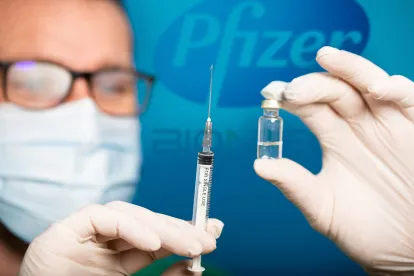Despite continuing disputes as to the legality and enforcement of the CMS’ vaccine mandate for certified providers and suppliers, CMS has indicated it will proceed with enforcement of the mandate in those states where it is not enjoined from doing so with clarifying guidance issued on December 28, 2021. See below for immediate action steps for those currently subject to the mandate.
As previously reported, on November 4, 2021 the Centers for Medicare and Medicaid (CMS) issued an Interim Final Rule (the CMS Rule) requiring most Medicare and Medicaid certified providers and suppliers to vaccinate staff members within 60 days.
Covered employers in the health care space began taking steps to ensure compliance by January 4, 2022. However, in the ensuing weeks, a flurry of court activity ensued, putting the status of the CMS Rule in question. In November, a Louisiana federal court issued an injunction prohibiting enforcement of the CMS Rule nationwide, causing CMS to temporarily pause its enforcement efforts. Then, in mid-December, the Fifth Circuit Court of Appeals issued an opinion partially upholding and partially reversing the injunction.
The effect of this has been that the CMS Rule is currently enjoined in 25 states, but may be enforced in the remaining 25 states and U.S. territories.
Meanwhile, the original January 4 compliance date has been fast-approaching, with employers in the non-enjoined states and territories having little guidance from CMS as to what would happen next, and when they would need to comply with the CMS Rule’s vaccination requirements.
On December 28, 2021, CMS provided answers to many of these open questions, announcing that it will begin enforcing its COVID-19 vaccine mandate as to regulated health care facilities in the District of Columbia, U.S. territories, and the 25 states where it is not currently judicially enjoined.
The agency also released guidance for state survey agencies on implementing survey and enforcement procedures, including facility specific guidance linked therein, for the vaccine mandate and updated its previously issued FAQs. As previously described, the mandate applies to staff and those who regularly come on site to Medicare- and Medicaid-certified health care facilities.
In its new guidance, CMS indicated that in addition to the District of Columbia and U.S. territories, CMS will move forward with enforcing its vaccine mandate in California, Colorado, Connecticut, Delaware, Florida, Hawaii, Illinois, Maine, Maryland, Massachusetts, Michigan, Minnesota, Nevada, New Jersey, New Mexico, New York, North Carolina, Oregon, Pennsylvania, Rhode Island, Tennessee, Vermont, Virginia, Washington and Wisconsin.
CMS has, however, modified the original compliance dates for the mandate. Facilities in the District of Columbia, U.S. territories, and the 25 states where the mandate is not enjoined must now comply with phase 1 of the mandate by January 27, 2022. This means that staff at all health care facilities included within the regulation must have received the first dose of a COVID-19 vaccine (or the single dose Johnson & Johnson vaccine) prior to that staff person providing any patient care, treatment, or other services within the covered facility. Facilities in the 25 states where the mandate is not enjoined must comply with phase 2 of the mandate, which requires all staff to have received their second dose of a COVID-19 vaccine, by February 28, 2022.
Medicare- and Medicaid-certified providers and suppliers in states where the mandate is enjoined are not currently required to comply with either phase, pending future litigation developments, and the mandate does not apply to full-time remote workers in any state that do not come into contact with onsite staff.
Given this news, impacted facilities/employers should immediately take the following steps:
-
Develop a policy and process or plan for vaccinating staff, providing exemptions and accommodations, and tracking staff vaccinations by January 27, 2022;
-
Ensure applicable staff receive the first dose of a primary series or a single dose COVID-19 vaccine by January 27, 2022.
-
Ensure eligible staff are fully vaccinated by February 28, 2022.
Federal, state, accrediting organization, and CMS-contracted surveyors will begin surveying for compliance with these requirements as part of initial certification, standard recertification or reaccreditation, and complaint surveys on January 27, 2022. If a facility is found not be compliant, surveyors will generally provide the facility with a chance to come into compliance before taking additional enforcement actions (e.g., plans of correction civil monetary penalties, denial of payment, termination, etc.). CMS also stated that it will use further enforcement discretion and not subject facilities to additional enforcement action for approximately 90 days following the publishing of the guidance in the following scenarios (1) facilities that have 80% compliance by January 27, 2022 and a plan to reach 100% compliance within 60 days; and (2) facilities that have 90% compliance by February 28, 2022 and a plan to reach 100% compliance within 30 days. In the facility specific guidance for surveyors, CMS indicated that when penalties do become necessary, penalties might be lower for those facilities that make a good-faith effort to comply with the mandate. Specifically, CMS stated that if a facility can provide “evidence that they have taken aggressive steps to have all staff vaccinated, such as advertising for new staff, hosting vaccine clinics, etc.” that CMS would view the evidence as a good-faith effort towards compliance.
Unfortunately, the new guidance does not include any additional information regarding how compliance will be evaluated in states with conflicting laws, but CMS has previously indicated in its original rule that it believes such laws will be preempted by its vaccine mandate. For states like Florida, which passed its own restrictions on employee vaccination mandates in November, this is particularly challenging. Employers located in states where the CMS mandate conflicts with state law should work closely with counsel to develop a workable plan for compliance, while understanding the risks associated with various approaches.
Finally, employers located in all states should continue to monitor the CMS mandate closely as the U.S. Supreme Court is set to hear oral arguments on January 7 on the emergency applications to stay the district court injunctions that have caused the mandate to remain on hold in 25 states (as well as on the OSHA emergency temporary standard that more generally applies to those employing 100 or more individuals).
Based on the Supreme Court’s ruling, we could see a variety of potential outcomes, ranging from entirely enjoining the mandate in all states and territories to lifting the injunction for the remaining 25 states. Either way, CMS’ position is likely subject to some change within the coming weeks and employers should remain attentive.






 />i
/>i


